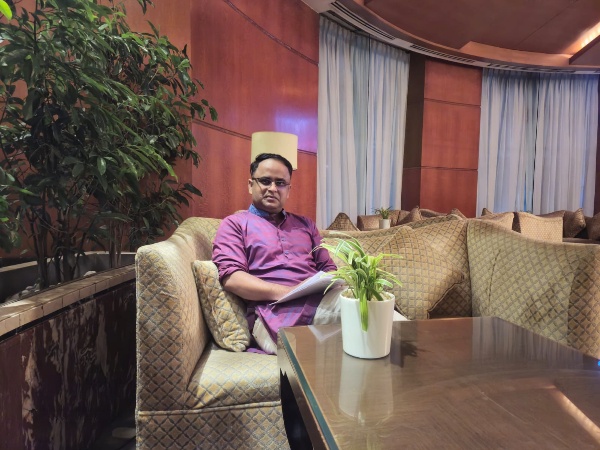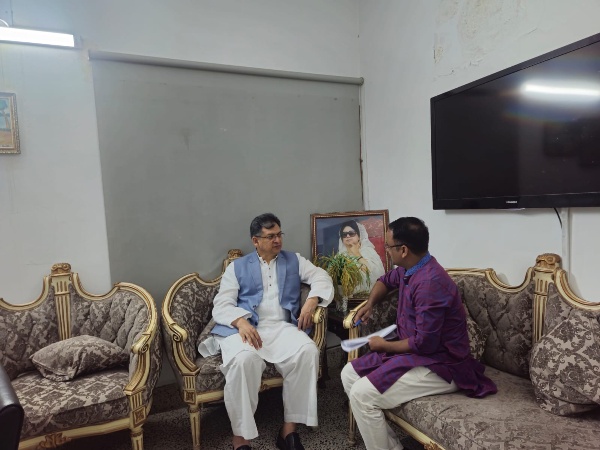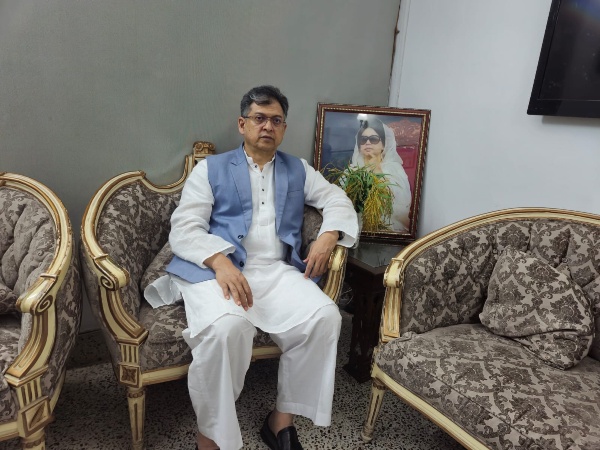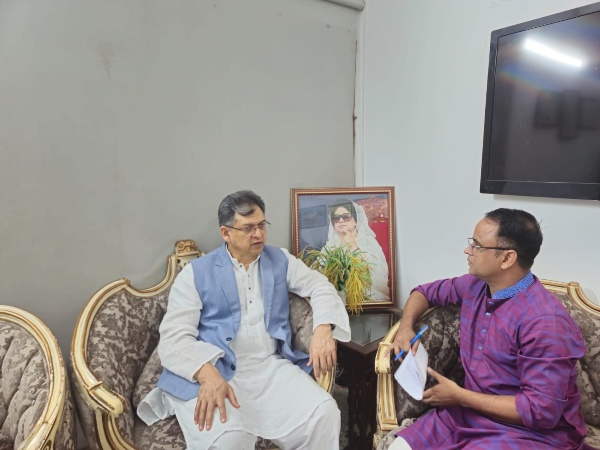Top BNP leader believes blocking party chiefs from becoming Prime Minister is “undemocratic”
-68a42aca760a7.jpeg)
For years, Salahuddin Ahmed remained an enigma. Known for his calm demeanor, measured tone, and charisma, he was once one of the BNP’s most prominent spokespersons–until his abduction, enforced disappearance, and subsequent years of exile in India.
With the fall of Sheikh Hasina’s autocratic regime, Salahuddin returned to Bangladesh. In a remarkably short time, he has reemerged as one of the BNP’s most recognizable and authoritative voices.
His stature grew further after the formation of the Consensus Commission, where he led the BNP delegation in marathon discussions with commission members and leaders of other political parties.
Glimpses from those meetings–shared through media clips and social media reels–have shown Salahuddin’s sharp legal mind and his mastery of constitutional law.
This week, Bangla Outlook’s Special Correspondent Abu Jakir met Salahuddin at the BNP headquarters in Gulshan. As monsoon rains soaked Dhaka and traffic choked the streets, the party office buzzed with activists and leaders, reviving a space once suffocated by state repression under Hasina’s rule. The air was electric with renewed energy.
Despite his packed schedule, Salahuddin welcomed Bangla Outlook for a wide-ranging conversation–on reforms, elections, the July Charter, and the uncertain but pivotal road ahead for Bangladesh’s politics.

Here is an excerpt of that conversation for our readers.
Abu Jakir: Let me get straight to a question many are asking. On the July Charter, the BNP has said constitutional issues will be settled by the next parliament. But some parties are demanding a legal framework for the Charter right now. If that push continues, what will be the BNP’s position?
Salahuddin Ahmed: In his address to the nation on the 5th August, the Honorable Chief Adviser Dr Muhammad Yunus outlined the election timetable and referenced the July National Charter now being drafted.
He made clear that the commitments enshrined in that Charter–agreed upon by all–will be implemented through the next elected Parliament. We too believe that this is the only legitimate, legal, and constitutional path.
Some political parties, however, are pressing for the Charter to be given immediate legal or constitutional standing. On this matter, the National Consensus Commission is consulting experts on possible mechanisms. Once their recommendations are shared with us, we will engage in discussion.
If a valid legal or constitutional framework emerges from this process, BNP will support it. Beyond constitutional amendments, should other lawful means arise to implement the Charter’s commitments–without creating constitutional complications–we would have no objection to accepting them.
AJ: How do you see the clause that the same person who is party president cannot be the Prime Minister?
SA: The proposal under discussion was this: the Prime Minister cannot simultaneously serve as both Leader of the House and party chief. Consensus was reached on two points–that the Prime Minister may also be Leader of the House. But the question of whether the Prime Minister can remain party chief divided opinion.
From BNP’s perspective, barring a Prime Minister solely because he or she is also party chief is undemocratic. Nowhere is it predetermined that the Prime Minister must be the party chief; it is for the elected members of Parliament to decide. The party leader may be chosen–or someone else entirely. That freedom is essential to democratic practice.
In fact, depriving a leader of the right to be Prime Minister simply because they head a party undermines democratic rights. In established democracies–the United Kingdom, the United States, and others–the norm is often that the party chief becomes Prime Minister or head of government. Exceptions exist, but the option remains open.
Our position is clear: the option must be preserved. To impose restrictions here would run counter to democratic principles and strip citizens of a legitimate political choice.
AJ: If there is no consensus on whether the party chief can become Prime Minister, will that affect or delay the election?
SA: On that specific point, we recorded a note of dissent. As did other parties on other issues. Our position is straightforward: if the people give us the mandate, we will uphold our proposal–there should be no restriction preventing a party chief from becoming Prime Minister. Should that situation arise, we will legislate accordingly.
At this stage, there is no need for such a law, nor any constitutional obligation to create one. Had all parties agreed that the party chief cannot be Prime Minister, then it would have required a constitutional amendment.
But since no consensus exists, the matter will ultimately rest with the voters. If those supporting the restriction win the mandate, they will pursue their version. If we win the mandate, we will pursue ours.
AJ: Who will be the next Prime Minister, if BNP is voted to power?
SA: That decision ultimately rests with the parliamentary party that secures a majority. We will not make any definitive statement at this moment. If we win the election, our parliamentary party will take the call.
Yet, the reality is clear to everyone: the natural choice for Prime Minister is our party leader, the nation’s leader, Begum Khaleda Zia. If she contests the election, the decision will follow one course; if she does not, it may take another. But the direction is obvious–and everyone already knows it.

AJ: Since NCP and Jamaat are pressing for the July Charter, a legal framework, and the PR system–if these demands are not met and they refuse to join the election, what will BNP do? Will you take steps to bring them into the process, or will doubts remain about whether the election will take place in February at all? How does BNP plan to restore their confidence?
SA: On electoral alliances, our stance remains unchanged. We stand with our partners from the simultaneous movement. Beyond that, we are in talks with several like-minded parties, including some Islamic political groups, and may contest the election together.
That decision, however, is not final. As for whether parties like the NCP will join such an alliance– that remains to be seen.
AJ: To ensure a functional parliament, is BNP prepared to enter into seat-sharing arrangements with other parties?
SA: Until the election schedule is announced, every party will maneuver with different strategies for alliances, and we are no exception. No final decision has been made yet. As an electoral tactic, alliances remain an option, but whether they happen will depend on ongoing discussions and the evolving situation.
AJ: Now, let me be very blunt on this–do you expect the election to be held in February?
SA: We hope and believe that as declared by the Chief Adviser, the national parliamentary election will be held within the given timeframe–in the first half of February.
AJ: Say, if NCP boycotts, then the election will not be inclusive. In that case, what will be BNP’s position?

SA: We believe no democratic party or force can oppose the people’s right to vote. For nearly two decades, the people have fought for democracy and that right. If it becomes evident that any party seeks to sabotage the election or sow uncertainty, the people themselves will rise and resist them.
AJ: How much confidence does BNP have that Dr Yunus will step down? And if Jamaat and NCP ultimately boycott the election, how will BNP respond?
SA: On this issue, the Chief Adviser’s Press Secretary, Shafiqul Alam, has already made it clear: the election will be held on schedule. Therefore, the question of his resignation simply does not arise.
AJ: But in a recent interview in Malaysia, Dr. Yunus warned that without justice and reforms, any election would only reproduce the old problems….
SA: Reforms and justice are already underway. Beyond constitutional amendments, most issues can be addressed through ordinance or executive order–and many are being implemented continuously. Recommendations that can be acted on immediately are being carried out.
Justice, however, lies with the judiciary. No artificial time frame can be imposed; rushing justice would itself be injustice. The judicial process is moving forward, and whichever government follows will have to carry it on.
As for the election, as I mentioned earlier, its schedule has already been announced.
AJ: Ahead of the election, we’ve seen several ambassadors meeting with NCP leaders. Have there been any such discussions with BNP regarding seat sharing? And do you believe foreign powers will attempt to meddle in the upcoming polls?
SA: No, there has been no such discussion–none at all about seat sharing. That stage has not yet arrived. I believe the meetings with diplomats are simply routine. It is standard practice for diplomatic missions to engage with all political parties, and I see nothing beyond that.
AJ: A recent BIGD survey shows BNP at 12%, Jamaat at 10%, NCP at 2.8%, with 49% undecided and 14% refusing to comment– meaning 63% of voters have yet to make up their minds. Do you think this undecided majority could pave the way for a new force to come to power?
SA: Why assume that any single organization’s survey is absolute truth? That would be a mistake. We, too, have conducted surveys through two or three different institutions. Our findings show that around 45% of people have confidence in BNP and intend to vote for us.
I’m not claiming it is over 50%, but even our survey cannot be taken as fully conclusive.
Surveys can give a rough sense of the situation, but if a political party commissions its own survey and splashes the results in the media, that too is open to question.
Until the people actually cast their votes, no survey can speak with certainty. What we can say, however, is that the majority sentiment in Bangladesh is with the BNP.
AJ: Some BNP leaders are accused of downplaying the role of the youth. Young activists point out that in the past 15 years, BNP couldn’t even remove the truckload of sand placed outside Khaleda Zia’s residence to block her movement–yet it was the youth who sparked the uprising. How do you respond to the charge that BNP is belittling them now?

SA: Those who have recently floated new political outfits have barely set foot in politics–their inexperience shows in such statements. Everyone must remember: for the last 16–17 years, it is BNP alone that has stood against the monster of Awami fascism–fighting for democracy, shedding blood, embracing martyrdom, enduring abduction, killings, disability, even blindness.
The recent student and people’s uprising is not separate from that struggle; it is a continuation of it. Our years of sacrifice cannot be dismissed. To belittle BNP’s democratic struggle is, in truth, to belittle the struggle of the people themselves.
AJ: When will BNP acting chairperson Tarique Rahman return to the country?
SA: The date has not yet been fixed. But we hope he will return very soon.
AJ: Despite repeated directives from the Chairperson, many BNP leaders and activists are still being implicated in criminal offenses. What does this signal?
SA: BNP is a large, democratic, liberal political party with millions of leaders and activists at the grassroots. It would be unrealistic to claim that none of them have ever violated the law–a few may have.
But whenever credible evidence surfaces, we take organizational action. In fact, the cases have now reached into the thousands, and we have called on law-enforcement agencies to act strictly. In some instances, we ourselves have handed individuals over to the authorities.
At the same time, investigations have revealed that many incidents initially reported in the media as BNP-linked were actually carried out by Awami fascists. Certain media outlets, sometimes in error, tried to pin those acts on BNP.
But I believe the government must be far stricter in maintaining law and order. These incidents should never reach the public in a way that creates the impression that the situation is deteriorating under the present administration.
It seems elements of the old fascist system within the police and bureaucracy have not yet become fully active or sincere in meeting public expectations. But those expectations today are sky-high. The government must act decisively and with firmness to live up to them.
AJ: My final question: do you believe the next parliament will end up being one-sided?
SA: We hope the upcoming election will stand credible before the world — free, fair, impartial, and acceptable. Whatever number of seats each party wins must be respected as the people’s mandate, their sovereign right. I choose not to dwell on apprehensions; I place my faith in the will of the people.
AJ: Thank you for your time.
—

